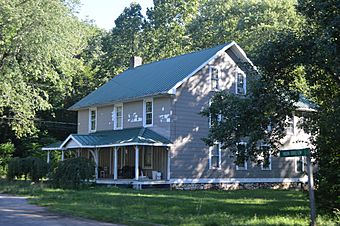Longdale Furnace, Virginia facts for kids
|
Longdale Furnace Historic District
|
|

House on State Route 269
|
|
| Location | Roughly, along Longdale Furnace Rd., Iron Ore Ln., Church Rd. and Conner Ln., near Clifton Forge, Virginia |
|---|---|
| Area | 50 acres (20 ha) |
| Built | 1827 |
| Architectural style | Queen Anne, Federal |
| NRHP reference No. | 95000898 |
Quick facts for kids Significant dates |
|
| Added to NRHP | August 3, 1995 |
Longdale Furnace is a small, unincorporated community. It is located east of Clifton Forge in Alleghany County, Virginia, United States.
Contents
What is Longdale Furnace?
Longdale Furnace is a historic area in Virginia. It was once a busy place where iron was made. Today, many of its old buildings and sites are protected. This area is known as the Longdale Furnace Historic District.
A Special Historic District
A historic district is a special area. It has buildings, sites, or structures that are important to history. The Longdale Furnace Historic District was added to the National Register of Historic Places in 1998. This means it is recognized as a nationally important historical site.
The district covers about 50 acres. It includes 27 important buildings. There are also 8 historic sites and 3 historic structures. These all tell the story of the Longdale Iron Company.
The Longdale Iron Company
The Longdale Iron Company was very important in this area. It started making iron a long time ago. The company's operations shaped the community. Many people worked for the company. Their homes and workplaces are part of the historic district today.
The first iron furnace was built in 1827. This stone furnace stack is still standing. It is one of the oldest parts of the district.
Important Buildings and Structures
Many buildings in the district show what life was like back then. They also show how iron was made.
- The original stone furnace stack was built in 1827. This is where the iron-making process began.
- The Longdale Iron Company Office is a two-story building. It was built in the late 1820s. This is where the company's business was managed.
- The Longdale Iron Company Laboratory was used for testing materials.
- Two tall brick chimneys stand out. They were part of the iron-making process.
- A brick machine shop was where tools and parts were made or repaired.
- The Firmstone-Johnson House was built in the 1870s or 1880s. It was likely a home for important company staff.
- The Assistant Manager's House is in the Queen Anne style. This style was popular in the late 1800s.
- The Company Doctor's Office was where workers and their families got medical care.
These buildings and sites help us understand the history of iron production. They also show how people lived and worked in the past.
 | Anna J. Cooper |
 | Mary McLeod Bethune |
 | Lillie Mae Bradford |



